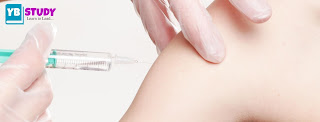What are Vaccines? Describe the Process of Vaccine Production.
What are vaccines? Describe the process of vaccine production?
Answer: A vaccine is an antigenic preparation used to stimulate the production of antibodies and induce immunity against several diseases.
- Vaccination is the most important method of preventing infection of micro-organisms, like bacteria and viruses.
- The process of vaccination or the first vaccine was produced by Edward Jenner in 1796.
- He derived the word vaccine from latin word vacca means’cow.
- He found that milkmaid once attacked by a cowpox diesease (not so harmful) were resistance to smallpox.
- Jenner concluded that due to injection of cowpox virus human body respond to both cowpox and smallpox virus.
- This led to the discovery of smallpox vaccine.
Vaccine production:
- The organisms are grown in medium for production of large amounts of toxins.
- By altering these toxins, toxoids are produced.
- These toxoids are not toxic.
- These toxoids acts as an antigens our immune system recognise them and produce antibodies against these antigens.
- The live organism is attenuated or deactivated so that it is no longer able to cause illness.
- The resulting mixture is diluted and adjuvant is added.
- Adjuvant is a substance which improves the immune response to the toxoids.

